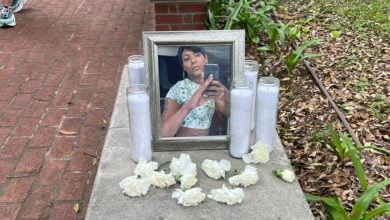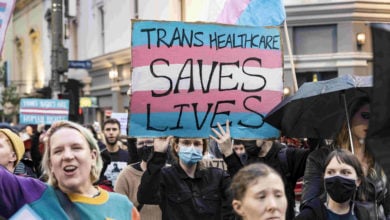The author is an attorney, author, and professor at the George Washington University. He is author of the legal treatise Hate Crimes Law (Westlaw), periodically revises the First Amendment chapter in Sexual Orientation and the Law (Westlaw), and authors briefs to the U.S. Supreme Court on behalf of various human and civil rights organizations.
With a decision expected from the U.S. Supreme Court in June on the constitutionality of Proposition 8 and the Defense of Marriage Act, much of the focus on marriage equality and LGBT rights in general has turned to these looming legal battles. The attention is deserved in some respects, since the Court has the power to affect legal rights for millions of people in important ways. But just as important to emphasize is how the legal decision is only part of the longer struggle. The movement for marriage equality has forced the people of the United States to rethink old prejudices, and this will be its most enduring legacy.
Same-sex couples have been demanding legal recognition of their marriages since at least 1970, and renewed in the context of the 2003 court decision in Massachusetts. The anti-equality movement had a simple strategy at that time: “Let the voters decide.” When asked only “Do you want gay marriage?,” most people’s immediate reaction was no. So this strategy worked for them for many years, as state after state voted against marriage equality in a fairly knee-jerk reaction.
Breakthroughs in the movement
But particularly after Prop. 8 in the California, the LGBT movement was able to expose the bigotry and hatred at the foundation of the opposition to marriage equality. The opposition became uglier, with claims in court and in public that same-sex marriage was some sort of threat to children and “traditional families.”
While the bigots tried to call this a question of human dignity, supporters of marriage equality successfully framed their argument as one of civil rights. In this way, the public came to realize that they were not just being asked to decide if they “liked” same-sex marriage, but rather if they accepted the right-wing’s extreme argument that gay and lesbian couples lacked social value and were dangerous to children. Today, some supporters of marriage equality may still be a little uncomfortable with same-sex marriage, but they know they are no longer willing to deny people legal rights because of baseless arguments and an earlier prejudice.
The courtroom struggle has advanced on account of this change in thinking and contributed to it. California District Judge Vaughn Walker’s handling of the Prop. 8 case was extremely significant because it forced opponents to try to substantiate their claims about the harms of same-sex marriage with reliable evidence. They could not, and it became established as undeniable that only prejudice was at work in the opposition’s claims.
‘Limited ruling’ leads to bigoted state laws
The safe money is betting on a limited ruling from the Supreme Court, invalidating the bigoted Prop. 8 and Defense of Marriage Act, but without making any sweeping statements about discrimination based on sexual orientation. This was the design of the Obama administration’s advocacy, picking up on a similar limited ruling from the 9th Circuit in the Prop. 8 case.
Although Judge Walker’s ruling in that case made clear that the arguments for Prop. 8 did not hold water, the Court and the administration said it should be thrown for its own faulty logic, but refused to even address the deeper issues. They pointed to the fact that Prop. 8 only prevented same-sex couples from using the term marriage, but did not under California law prevent same-sex couples from being able to adopt children and enjoy other rights. The Circuit court wrote, “Proposition 8 therefore could not have been enacted to advance California’s interests in childrearing or responsible procreation, for it had no effect on the rights of same-sex couples to raise children or on the procreative practices of other couples.”
If the Supreme Court rules in a similar fashion, this leaves open a big question: what happens in states that do prohibit same-sex couples from adopting children and otherwise discriminate against same-sex couples extensively? Will these states be allowed to ban marriage equality on the basis that they are in accordance with such other state laws?
For this and other reasons, some members of the Supreme Court may be inclined to make broader declarations of law, to the effect that discrimination on the basis of sexual orientation is inconsistent with constitutional principles of equality. (Despite some legal wins, the Court has never said this.)
On the other hand, the right wing of the Court seems to be positioning itself to attack LGBT people’s ability to invoke the protections of the equal protection clause at all. That clause exists to protect groups from being discriminated against in popularly enacted laws. Some legal precedent says that a hallmark of such claims is that the “suspect class” of people facing discrimination must lack political power. When Chief Justice John Roberts told one of the advocates for marriage equality that “political figures are falling over themselves to endorse your side of the case,” he was suggesting that LGBT discrimination has political power and would thus not qualify. This ignores the fact that there are large sections of the country where the progress in attitudes and political reforms has not taken root.
Whatever the majority opinion of the Supreme Court holds, the marriage equality movement has already accomplished significant breakthroughs. Legal protections are of course critical and will come as part of a broader societal shift that increasingly rejects old prejudices and becomes open to new ways of thinking and living.






